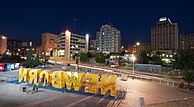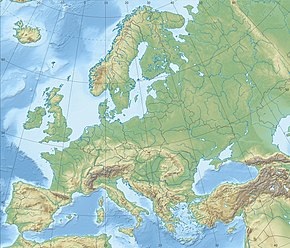
Back Pristina Afrikaans Pristina ALS ፕርሽቲና Amharic Pristina AN بريشتينا Arabic بريشتينا ARZ Prístina AST Prishtina AVK Priştina Azerbaijani پریشتینا AZB
This article needs to be updated. (May 2021) |
Pristina | |
|---|---|
From top, left to right: view of Pristina; Goddess on the Throne; Newborn Monument; Kosovo Museum; Clock Tower; Great Hamam and Imperial Mosque; and Skanderbeg Monument | |
| Coordinates: 42°39′48″N 21°9′44″E / 42.66333°N 21.16222°E | |
| Country | Kosovo |
| Municipality | Pristina |
| Government | |
| • Type | Mayor–council |
| • Mayor | Përparim Rama (LDK) |
| • Council | Pristina Municipal Council |
| Area | |
| • Municipality | 523.13 km2 (201.98 sq mi) |
| • Rank | 6th in Kosovo |
| Elevation | 652 m (2,139 ft) |
| Population (2011)[2] | |
| • Municipality | 198,897 |
| • Rank | 1st in Kosovo |
| • Density | 380/km2 (980/sq mi) |
| • Urban | 161,751 |
| • Rural | 37,146 |
| • Ethnicity | |
| Demonym(s) | Standard Albanian: Prishtinas (m) Prishtinase (f) Gheg Albanian: Prishtinali (m) Prishtinalike (f) |
| Time zone | UTC+1 (CET) |
| • Summer (DST) | UTC+2 (CEST) |
| Postal code | 10000 |
| Area code | +383 (0) 38 |
| Vehicle registration | 01 |
| Motorways | |
| Major airport | Adem Jashari Airport |
| Website | kk.rks-gov.net/prishtine/ |
Pristina or Prishtina (UK: /ˈpriːʃtɪnə, prɪʃˈtiːnə/ PREE-shtin-ə, prish-TEE-nə,[3][4] US: /ˈprɪʃtɪnə/ PRISHT-in-ə)[5][a] is the capital and largest city of Kosovo. It is the administrative center of the eponymous municipality and district.[6]
In antiquity, the area of Pristina was part of the Dardanian Kingdom. The heritage of the classical era is represented by the settlement of Ulpiana. After the Roman Empire was divided into a western and an eastern half, the area remained within the Byzantine Empire between the 5th and 9th centuries. In the middle of the 9th century, it was ceded to the First Bulgarian Empire, before falling again under Byzantine occupation in the early 11th century and then in the late 11th century to the Second Bulgarian Empire. The growing Kingdom of Serbia annexed the area in the 13th century and it remained under the Serbian Empire in the 14th century up to the start of the Ottoman era (1389-1455). The next centuries would be characterized by Ottoman rule. During this period, Pristina developed from a village to a major urban center of the region. Following the end of the First Balkan War in 1914, it became a part of the newly formed Kingdom of Serbia. In 1948, it was chosen as the capital of the province SAP Kosovo under the statehood of Yugoslavia. Furthermore, Pristina would continue to serve as the capital of Kosovo after its 2008 independence from Serbia.
Pristina seems to have been a small village before the late 15th century. It is first recorded in 1342 as a village during the reign of Stefan Dušan, and about a century later in 1455 at the beginning of the Ottoman era it had a small population of 300 households. In the following century, Pristina became an important mining and trading center due to its strategic position near the rich mining town of Novo Brdo. The city was known for its trade fairs and items, such as goatskin and goat hair as well as gunpowder.[7]
Pristina is the capital and the economic, financial, political and trade center of Kosovo, due to its location in the center of the country. It is the seat of power of the Government of Kosovo, the residences for work of the President and Prime Minister of Kosovo, and the Parliament of Kosovo. Pristina is also the most important transportation junction of Kosovo for air, rail, and roads. Pristina International Airport is the largest airport of the country and among the largest in the region. A range of expressways and motorways, such as the R 6 and R 7, radiate out the city and connect it to Albania and North Macedonia. Pristina will host the 2030 Mediterranean Games.
- ^ "Komisioni për majten e territorit të Republikës së Kosovës" (PDF) (in Albanian). Prime Minister Office of Kosovo. p. 52. Archived from the original (PDF) on 22 September 2020. Retrieved 2 October 2021.
- ^ "Regjistrimi i Popullsisë, Ekonomive Familjare dhe Banesave në Kosovë 2011 – Rezultatet Përfundimtare: Të Dhënat Demografike sipas Komunave" (PDF) (in Albanian). Kosovo Agency of Statistics. p. 14. Archived from the original (PDF) on 4 March 2016. Retrieved 4 October 2021.
- ^ "Pristina". Lexico UK English Dictionary. Oxford University Press. Archived from the original on 24 April 2020.
- ^ "Pristina". Collins English Dictionary. HarperCollins. Retrieved 20 September 2020.
- ^ "Pristina". The American Heritage Dictionary of the English Language (5th ed.). HarperCollins. Retrieved 20 September 2020.
- ^ a b "Define – Pristina". Dictionary.com. Archived from the original on 11 March 2021. Retrieved 2 October 2021.
- ^ Warrander, Gail; Verena Knaus (2010). Kosovo. Bradt Travel Guides Ltd, UK. pp. 85–88. ISBN 978-1-84162-331-3.
Cite error: There are <ref group=lower-alpha> tags or {{efn}} templates on this page, but the references will not show without a {{reflist|group=lower-alpha}} template or {{notelist}} template (see the help page).










